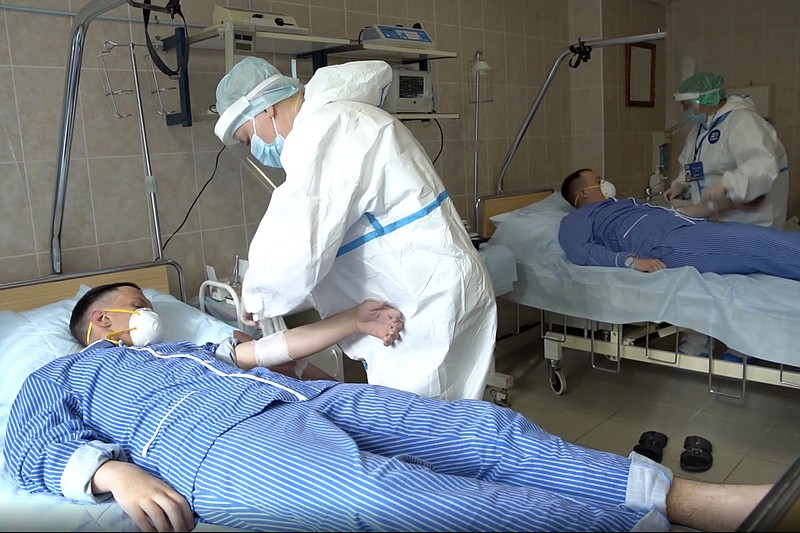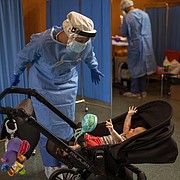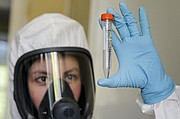MOSCOW -- Russian President Vladimir Putin claimed Tuesday that Russian scientists achieved a breakthrough in the global vaccine race, announcing that the country has become the first to approve an experimental covid-19 vaccine and that his own daughter has already taken a dose.
[CORONAVIRUS: Click here for our complete coverage » arkansasonline.com/coronavirus]
Officials have pledged to administer the possible vaccine to millions of people this summer and fall -- including tens of thousands of teachers and front-line health-care workers in the coming weeks before even finishing clinical trials -- with the formula developed by the Gamaleya Institute in Moscow.
But Russia's hard charge toward a potential vaccine has raised alarm among global health experts that the country is jumping dangerously ahead of critical, large-scale testing that is essential to determine whether a possible covid-19 protection is safe and effective. Few details of the Gamaleya research have been made public or undergone peer review.
[Video not showing up above? Click here to watch » https://www.youtube.com/watch?v=U45IfbhvjfU]
Russia's Health Ministry did not respond to requests for comment, and the Gamaleya Institute referred an interview request to the ministry.
Konstantin Chumakov, a member of the Global Virus Network, an international coalition working on viral threats, said "it is scientifically impossible to prove efficacy" without widespread trials, known as Phase 3.
"Using it in general population before the results of Phase 3 trials are fully studied is a gamble," he said. "A Russian roulette, if you will."
The vaccine is named Sputnik V, a reference to the first orbital satellite, which was launched by the Soviet Union in 1957 and set off the global space race. The name also evoked how Putin's government has seen the vaccine race as a point of national pride and competition on a global scale, with labs in the United States, Europe, China and elsewhere also in the hunt for a potential vaccine.
[Gallery not loading above? Click here for more photos » arkansasonline.com/812covid/]
"Of course, what counts most is for us to be able to ensure the unconditional safety of the use of this vaccine and its efficiency in the future. I hope that this will be accomplished," Putin said at a meeting with government members Tuesday, adding that one of his two daughters had received the potential Gamaleya vaccine. He didn't identify which daughter.
While Russian officials have said large-scale production of the vaccine wasn't scheduled until September, Deputy Prime Minister Tatyana Golikova said vaccination of doctors could start as early as this month. Officials say they will be closely monitored after the injections. Mass vaccination may begin as early as October.
"We expect tens of thousands of volunteers to be vaccinated within the next months," Kirill Dmitriev, chief executive of the Russian Direct Investment Fund that bankrolled the vaccine, told reporters.
The vaccine developed by the Gamaleya Institute in Moscow with assistance from Russia's Defense Ministry uses a different virus -- the common cold-causing adenovirus -- that's been modified to carry genes for the "spike" protein that coats the coronavirus, as a way to prime the body to recognize if a real covid-19 infection comes along.
That's a similar technology as vaccines being developed by China's CanSino Biologics and Britain's Oxford University and AstraZeneca -- but unlike those companies, Russian scientists haven't published any scientific information about how the vaccine has performed in animal tests or in early-stage human studies.
Dmitriev said even as Russian doctors and teachers start getting vaccinated, advanced trials are set to start today that will involve "several thousand people" and span several countries, including the United Arab Emirates, Saudi Arabia, the Philippines and possibly Brazil.
The Associated Press couldn't find documentation in the Russian Health Ministry's records indicating that permission to start the advanced trials was granted. The ministry has not responded to a request for comment.
The World Health Organization has urged that all vaccine candidates go through full stages of testing before being rolled out, and said Tuesday that it is in touch with the Russian scientists and "looks forward to reviewing" Russia's study data. Experts have warned that vaccines that are not properly tested can cause harm in many ways -- from harming health to creating a false sense of security or undermining trust in vaccinations.
ELSEWHERE IN WORLD
Russia's announcement comes as the worldwide count of known covid-19 infections climbed past 20 million Monday, with more than half of them from just three countries: the U.S., India and Brazil, according to the tally kept by Johns Hopkins University.
The severe and sustained crisis in the U.S. -- over 5 million cases and 163,000 deaths, easily the highest totals of any country -- has dismayed and surprised many around the world, given the nation's vaunted scientific ingenuity and the head start it had over Europe and Asia to prepare.
South Africa, Colombia, Mexico, Peru, Argentina, Russia and the Philippines round out the list of the top 10 countries contributing the most new cases to the global tally since July 22, according to an Associated Press analysis of Johns Hopkins data.
The real number of people infected by the virus around the world is believed to be much higher -- perhaps 10 times higher in the U.S., according to the Centers for Disease Control and Prevention -- given testing limitations and the many mild cases that have gone unreported or unrecognized.
Some of the worst-hit nations have been those whose leaders have downplayed the severity of covid-19, undercut the advice of health experts and pushed unproven remedies.
President Donald Trump, Brazil's President Jair Bolsonaro and Mexican President Andres Manuel Lopez Obrador, for example, all rarely wear masks and have resisted calls for strict lockdowns. Trump and Bolsonaro have promoted the anti-malaria drug hydroxychloroquine, even though studies have shown it to be useless against the virus, with potentially deadly side effects.
In the U.S., Mexico and Brazil, testing has been criticized as inadequate. While the U.S. has ramped up testing in recent months, Americans have faced discouragingly long lines and delays in getting the results. In Mexico, 47% of tests are coming back positive, suggesting that only seriously ill people are getting screened.
Contact tracing, which has helped authorities in other countries get a handle on the spread, has also been criticized as insufficient in all three countries.
Elsewhere around the world, New Zealand, which has been praised for quickly getting the virus under control, reported the first cases of local transmission in the country in 102 days. Prime Minister Jacinda Ardern said four cases were discovered in a single Auckland household.
SCHOOL QUARANTINES
In Georgia, a school district has quarantined more than 900 students and staff members because of possible exposure to the coronavirus since classes resumed last week and will temporarily shut down a hard-hit high school in which a widely shared photo showed dozens of maskless students posing together.
The quarantine figures from the Cherokee County School District include at least 826 students, according to data that the district posted online. Located about 30 miles north of Atlanta, the district serves more than 42,000 students and began its new school year on Aug. 3.
Georgia on Tuesday posted its highest single-day death total yet in the pandemic at 137 fatalities, according to the state Department of Public Health. The state is currently averaging reports of more than 60 deaths each day though people may have died earlier.
The school quarantines were announced a day after Georgia Gov. Brian Kemp said the reopening of some of the state's schools amid the coronavirus outbreak has gone well -- except for the viral photos of students crowded together without masks.
The photos showed students standing shoulder to shoulder in crowded hallways at North Paulding High School northwest of Atlanta and squeezed together for first-day-of-school senior photos at two high schools in Cherokee County, including Etowah, which has had more than 300 students and staff members told to quarantine. Few students in the photos wore masks.
In California, the San Diego Union-Tribune reported that the San Diego Unified School District will not reopen until there are fewer than seven community outbreaks over a week-long period. That requirement is on top of the California state measure that requires counties to have a case rate of 100 or fewer cases per 100,000 people for two weeks before allowing public or private schools to reopen.
SOCIAL MEDIA POSTS
Additionally on Tuesday, Facebook said it took down 7 million posts pushing covid-19 misinformation from its main social media site and Instagram between April and June as the company tried to combat the rapid spread of dangerous information about the virus.
The company also put warning notes on 98 million covid-19 misinformation posts on Facebook during that time period -- labeling posts that were still misleading but not deemed harmful enough to remove.
Facebook and fellow big social media sites Twitter and YouTube have been scrambling to keep up with the flood of posts promoting fake cures or harmful speculation about the spread of the novel coronavirus since early this spring. Facebook put policies in place to try to regulate covid-19 posts, but their moderation teams that monitor such posts have also been disrupted as offices remain closed.
Facebook sent its content moderators home in March, a move that led to fewer posts being removed in certain rule-breaking areas between April and June. But other policies benefited from improved artificial intelligence technology, and Facebook reported a bump in removing posts for violating some policies.
Tuesday's reports was Facebook's sixth on how well its rules are being enforced.
The company took down 22.5 million posts on Facebook for violating its hate speech rules during the time period, an increase from 9.6 million posts during the first quarter of the year. Much of that increase was because of better detection technology and adding three languages to its automated system that searches for violating posts, Facebook said.
Information for this article was contributed by Isabelle Khurshudyan, Carolyn Y. Johnson, Rachel Lerman and Terrence McCoy of The Washington Post; and by Mark Stevenson, Nicky Forster, Michelle R. Smith and staff members of The Associated Press


